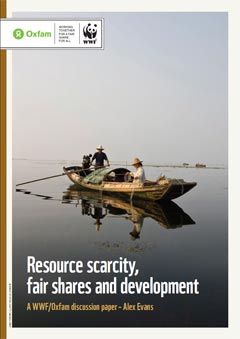 Yesterday WWF and Oxfam co-hosted a workshop in London on scarcity, fair shares and development – I did the introductory presentation, and wrote a paper ahead of the event which is published online today. In one sentence, my argument at the workshop was that,
Yesterday WWF and Oxfam co-hosted a workshop in London on scarcity, fair shares and development – I did the introductory presentation, and wrote a paper ahead of the event which is published online today. In one sentence, my argument at the workshop was that,
As the 21st century global economy hits natural resource limits and planetary boundaries, fundamental questions about fair shares will start to arise – and these questions will increasingly come to be seen as the new front line for international development.
As I stressed in the presentation,this is not to say that I believe we’re headed for a neo-Malthusian nightmare:
On the contrary, I think we can be confident that markets will adapt and that technological innovations will emerge – as they always do. But that process of transition will take time. It will need to overcome inertia, market failures, externalised costs and perverse subsidies. And until it’s complete, poor people and poor countries risk losing access to resources that they depend on for their basic needs. And so any discussion of limits is also, inevitably, a discussion about fair shares.
And this will be a different kind of ‘fairness’ agenda to the one that those of us who think of ourselves as progressives are used to. I think we’ve only just begun to internalise just what a game changer the emergence of environmental and natural resource limits will be for global agendas about justice and equality:
Left and right have long disagreed about more or less everything, except the existence of an expanding ‘cake’ to share out. As long as the cake is expanding, then you can argue – as the political philosopher John Rawls famously did in his Theory of Justice back in 1971 – that inequality is OK if the worst off people are better off, in absolute terms, than they’d be under an equal distribution. But if the cake is finite, then by definition more for the better off means less for the worse off. It’s a much starker proposition.



